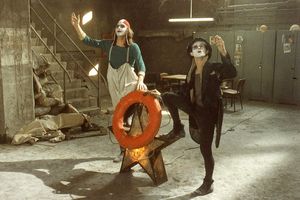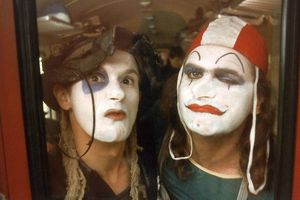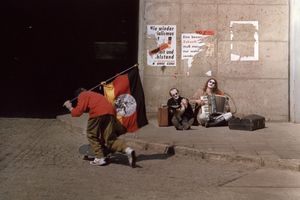Letztes aus der Da Da eR
Director: Jörg Foth, 86 Min., Color, Feature Film
Deutschland
DEFA Studio Babelsberg GmbH, 1990
- Film/Video Format
- 35 mm
- Length in m
- 2359
- Other Title
- Da-Da-eR; Letztes aus der DaDaeR
- English Title
- Latest from the Da-Da-R
- Premiere Date
- Release Date (for Cinema)
- Literary Source
- Mensching, Steffen; Wenzel, Hans-Eckardt: "Letztes aus der Da Da eR", Clownspiel
Short Summary (English)
The two clowns, Meh and Weh, are served breakfast in their gloomy prison cell by a woman with a revolver. Having eaten, they set out on a tour through the Da Da eR (a wordplay on the DaDa art movement and the German acronym for East Germany - DDR) using a form of cabaret to comment on current affairs. They take a trip to the most bizarre and striking landmarks and events. At a Walpurgis Night celebration that turns out to be a reunification party they are sneered at, insulted and finally chased away.
Steffen Mensching and Hans-Eckardt Wenzel - highly acclaimed East German poets, songwriters and clowns - caught people’s attention in the final years of the GDR with their two caustic literary-musical programmes, a mix of revue, cabaret and burlesque. Their stage shows were called "Altes aus der DaDaeR" and "Neues aus der DaDaeR". LETZTES AUS DER Da Da eR is a film adaptation of the shows which captures both political and human concerns from the turbulent months from October 1989 to October 1990.
LETZTES AUS DER Da Da eR plays with both the traditional clown’s act and the typical form of a music and film revue. The locations of the filmic odyssey are carefully chosen, reflecting the ambiguities of political events and social reality in the GDR. Director, Jörg Foth, and the duo Mensching and Wenzel succeed in producing a satire on conditions around the time of the fall of the Berlin Wall and the reunification.
LETZTES AUS DER Da Da eR is one of the final productions finished in East Germany before the 3rd October 1990.

(Dir.: Jörg Foth, 1990) Photography: Rüdiger Pelikan

(Dir.: Jörg Foth, 1990) Photography: Rüdiger Pelikan
Film Crew
- Director
-
- Jörg Foth
- Script
-
- Jörg Foth
- Thomas Plenert
- Scenario
-
- Steffen Mensching
- Hans-Eckardt Wenzel
- Camera
-
- Thomas Plenert
- Film Editing
-
- Renate Schäfer
- Cast
-
- Steffen Mensching (Meh)
- Hans-Eckardt Wenzel (Weh)
- Irm Hermann (Sie)
- Christoph Hein (Müllmann)
- Gustav-Adolf (Spitzname: Täve) Schur (Postbote)
- Gerd Wolf (Fährmann)
- André Hennicke (Menschenaffe)
- Peter Dommisch (Moderator)
- Assistant Director
-
- Sybille Junge
- Assistant Camera
-
- Norbert Kuhröber
- Jens Kunkel
- Rüdiger Pelikan
- Production Design
-
- Matthias Belkner
- Script Editing
-
- Angelika Ngúyen
- Music
-
- Dieter Staskowiak (Musik / Liederarrangements)
- Hans-Eckardt Wenzel (Musik / Lieder)
- Sound
-
- Andreas Kaufmann
- Michael Homann
- Klaus Wolter (Musik)
- Christfried Sobczyk (Tonmischung)
- Musical Performance
-
- Hans-Eckardt Wenzel (Gesang)
- Steffen Mensching (Gesang)
- Gerd Wolf (Gesang: Bass)
- Kammerchor des Berliner Rundfunk-Sinfonieorchesters (Gesang, Leitung: Sebastian Weigle)
- DEFA-Sinfonieorchester (Leitung: Manfred Rosenberg)
- Karola Elssner (Saxophon)
- Mathias Gawel (Drums)
- Costume Design
-
- Charlotte Busse
- Make-Up
-
- Frank May (geb. Zucholowsky)
- Props
-
- Dietrich Kraft
- Unit Production Management
-
- Dieter Anders
- Dieter Albrecht
- Executive Producer
-
- Manfred Renger
- DEFA Photography
-
- Rüdiger Pelikan
Short Summary (German)
Zwei Clowns, Meh und Weh, sitzen in einer düsteren Gefängniszelle. Eine Dame mit Revolver serviert ihnen das Frühstück. Als sie es verspeist haben, brechen sie auf zu einer kabarettistischen Odyssee durch die DaDaeR. Stationen sind unter anderem das Rüdersdorfer Zementwerk, in dem Gefangene den Zement für den Mauerbau produzierten, Industrieruinen, Mülldeponien, eine Veranstaltung im Kulturhaus, eine Ordensverleihung im Staatsratsgebäude und die Walpurgisnacht, wo sie sich in die Wiedervereinigungsfeier mischen und belächelt, beschimpft und schließlich verjagt werden.
(Quelle: Das zweite Leben der Filmstadt Babelsberg. DEFA-Spielfilme 1946-1992)



